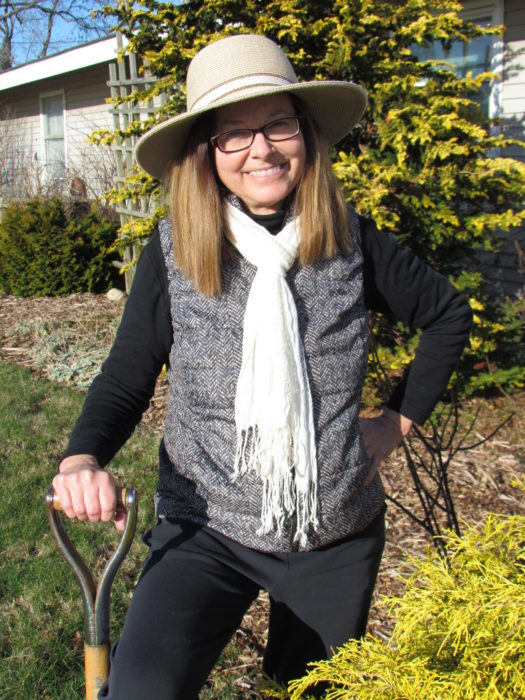
Cornell Cooperative Extension of Suffolk County’s annual Spring Gardening School was canceled in 2020 due to the pandemic, but the all-day horticultural education event is coming back this year and, for the first time, it will be presented virtually.
Spring Gardening School will take place via the video conferencing app Zoom on Saturday, March 20, beginning with the keynote address, “Nature’s Best Hope,” delivered by entomologist and author Doug Tallamy. Twelve classes will follow, many of which will touch on the conservation theme of the keynote address. Attendees can join three programs live and will also have the option of later watching recordings of the classes that were going on simultaneously — another first for Spring Gardening School, which was not recorded in the past.
Roxanne Zimmer, the community horticulture specialist for Cornell Cooperative Extension of Suffolk County, explained that Spring Gardening School has been held on a Saturday in spring every year since the 1980s at a high school or middle school. “It’s great because you feel like a bunch of teenagers going from class to class about gardening topics,” she said. “Some of them are workshops, some of them are presentations.”
In 2020, the event was planned for April and was sold out with 300 guests registered before New York State shut down. In 2021, an in-person event is still out of the question, but Ms. Zimmer explained that the online format has its advantages, such as lifting attendance caps.
“This is the first year that the caps no longer matter because these are Zoom sessions,” she said. “We’re not limited by the 25 people that can fit in the classroom. That’s a real opportunity because that means more people have the opportunity to hear all of our speakers.”
In addition to capacity no longer being a concern, distance doesn’t matter either.
“Another advantage of this being virtual is that we can attract speakers to Spring Gardening School this year who we never would ever be able to attract, like our keynote, Doug Tallamy, like Ann-Marie Powell, who’ll join us from the U.K.,” Ms. Zimmer said.
Mr. Tallamy lives in Pennsylvania near the Delaware border and researches how nonnative plants influence food webs and biodiversity at the University of Delaware. His books, including “Nature’s Best Hope” and “Bringing Nature Home,” are highly regarded in the native plant movement, and he is an in-demand speaker nationally.
Ms. Powell is a renowned garden designer based in Hampshire, England, with several Royal Horticultural Society awards. She’s seen on the BBC and her garden writing has appeared in many U.K. and international publications. At Spring Gardening School, she will present “Plants, People, Place,” explaining how to design an extraordinary space and showing why particular plants were chosen in various gardens.
Anne Raver, who lives in Rhode Island and has been a garden writer for both Newsday and The New York Times, will present “Going Native,” in which she will show how she applied Mr. Tallamy’s advice, replacing exotic plants with natives and her lawn with an organic vegetable garden.
“The reason I organized many of these speakers is around the theme of we all need to be better stewards of our backyards — or put it another way, being a better steward of the land begins at home,” Ms. Zimmer said.
Cornell Cooperative Extension turf specialist Tamson Yeh will present “Reduce the Lawn,” Nancy Gilbert of the Peconic Land Trust Board will present “Gardening for Birds,” and Heather Coste of Four Seasons Garden and Breezy Island at Bayard Cutting Arboretum in Great River will present “Natives for Tough Places.”
Mina Vescera, Cornell Cooperative Extension’s nursery and landscape specialist, will talk about “Ornamental Woodies,” the trees and shrubs in the home landscape. Dennis Schrader, co-owner of Mattituck wholesale greenhouse Landcraft Environments, will showcase a garden with tender perennials and tropicals in “Hot Plants for Cool Climates.”
For gardeners who are interested in edible gardening, there’s Jessica Damiano’s “Tomatomania,” Michael Veracka’s “Edible Landscapes,” and Louann Rothe’s “Culinary Herbs.”
Photographer Larry Lederman will show gardens he has photographed in the Hudson Valley, the Hamptons and Connecticut in “Garden Portraits,” and Noah Wilson-Rich, the co-founder of national beekeeping service Best Bees in Boston, will explain the benefits of having more pollinators on a property.
“There is something for just about every type of gardener,” Ms. Zimmer said.
Registrants can choose the Seedling package, including the keynote and three programs, for $50, or the Full Bloom, including the keynote and all 12 programs, for $75. The registration deadline is Friday, March 12. Register at weblink.donorperfect.com/SGS. For more information, contact Sarah Osborn at so348@cornell.edu or 631-591-2315.